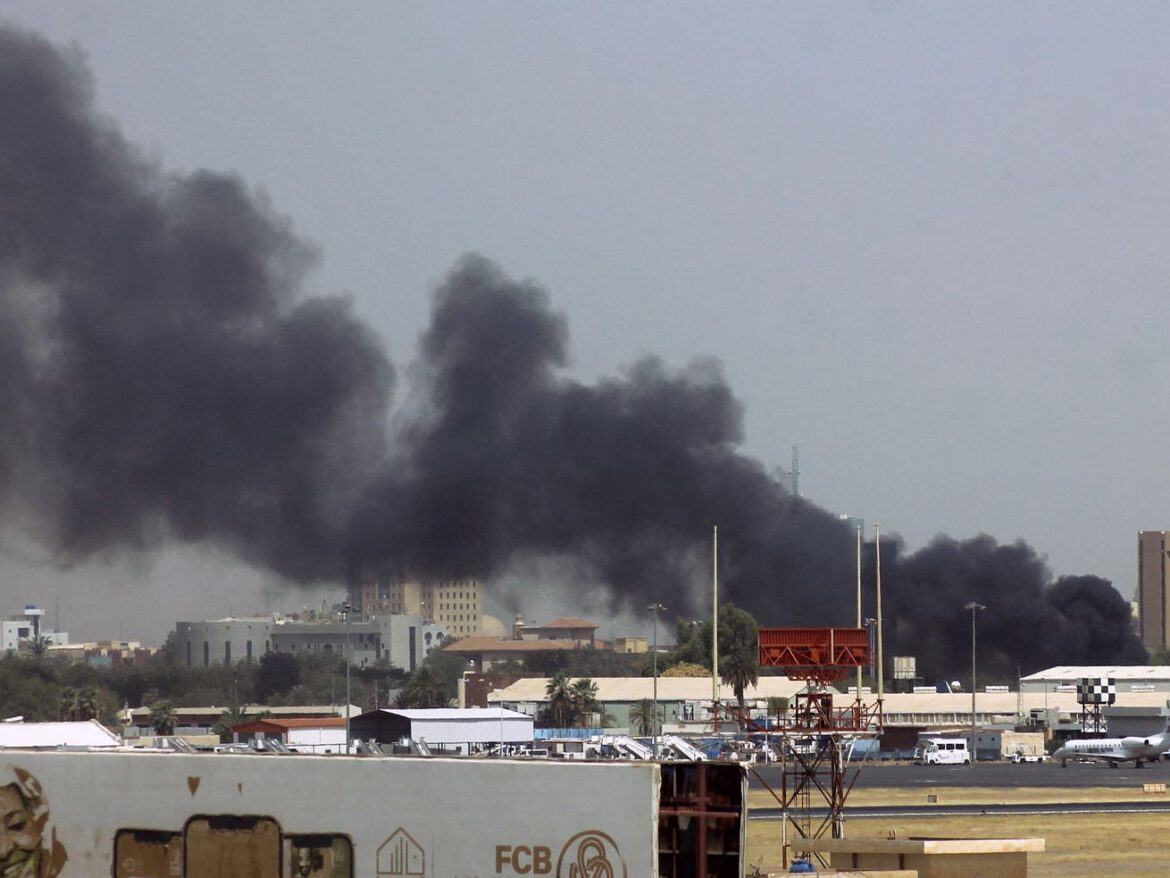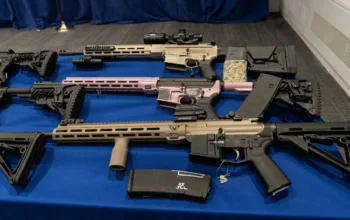Sudanese citizens have fought for democracy, but Saturday’s hostilities threaten the transition process.
Violence between the Sudanese Armed Forces (SAF) and a government paramilitary force, the Rapid Support Forces (RSF), roiled Sudan’s capital Khartoum Saturday. Sudan has struggled to transition to civilian rule after overthrowing dictator Omar al-Bashir in 2019; Saturday’s clashes are a further impediment to democracy.
Each armed group has blamed the other for instigating Saturday’s violence, which has thus far killed at least three people, according to the BBC. The RSF has claimed control over key sites in the capital Khartoum, including three airports, the army chief’s residence, and the presidential palace, with attacks near the defense ministry, army headquarters, and state television station also reported. The armed forces deny the RSF’s claims and have announced attacks on RSF bases. Clashes in Darfur, Forobaranga, and Merowe have also been reported.
Gen. Abdel Fattah al-Burhan of the SAF and Gen. Mohamed Hamdan Dagalo, also called Hemedti, of the RSF agreed on Friday to defuse long-simmering tensions between the two groups over military leadership in a civilian government as well as disagreements over the timetable for the RSF’s integration into the regular army.
The RSF last month began mobilizing forces in Khartoum and other locations, Reuters reported Friday, an outward indicator of just how far the situation had deteriorated. Despite calls for talks on Friday, Hemedti on Saturday told Al Jazeera the RSF would fight until all military bases are captured.
Abdalla Hamdok, Sudan’s civilian former prime minister, released a video statement on Saturday calling for an immediate cease to the hostilities. “I demand al-Burhan, the army commanders, and the RSF leaders to stop the bullets immediately and for the voice of reason to rule,” he said in the address. “There is no victor over the corpses of its people.”
Hamdok led Sudan under a power-sharing agreement with military actors after a popular uprising toppled former Sudanese leader Omar al-Bashir in 2019, but was ousted in 2021 in a coup led by Burhan and Hemedti.
United Nations Secretary-General Antonio Guterres and the head of the UN Integrated Transition Assistance Mission in Sudan Volker Perthes both called for an immediate end to the violence on Saturday, as did multiple international leaders including Secretary of State Antony Blinken and Ethiopian President Abiy Ahmed, whose own nation has been rocked by civil conflict since 2020. Guterres announced on Twitter that he would engage with the African Union and other regional leadership to help put a democratic transition back on track.
I condemn the outbreak of fighting between the Rapid Support Forces & the Sudanese Armed Forces in Sudan.
I’m engaging with the AU and leaders in the region & reaffirm the commitment of the @UN to support the people of Sudan in their efforts to restore a democratic transition.
— António Guterres (@antonioguterres) April 15, 2023
Meanwhile, fighting continues in Khartoum and the city of Omdurman across the Nile from the capital. Fire and explosions are everywhere,” Amal Mohamed, a doctor at one of Omdurman’s public hospitals told the Associated Press Saturday. “All are running and seeking shelter.”
Saturday’s violence is a further setback to democratic transition
Despite strong civil society participation and the express wishes of the Sudanese people, the transition to democracy after decades of Bashir’s authoritarian rule has been enormously challenging; Saturday’s violence is just the latest breakdown in the transitional process.
Power struggles, too, are nothing new in Sudan; since its independence in 1956, Sudan has undergone the highest number of attempted coups of any African nation, the New York times reported Saturday. That kind of entrenched instability tends to breed further coups, too.
The RSF is an officially recognized independent security force made up of about 100,000 troops, according to Reuters. Though the group’s relationship with the regular military has at times been uneasy, the groups did work together to oust Bashir, and the integration of the RSF into the SAF is a tenet of the democratic transition.
Bashir, Sudan’s authoritarian former leader, utilized Janjaweed paramilitary groups, made up of Sudanese Arab fighters including the forces that would become the RSF, to put down an uprising in the Darfur region in the early 2000s. That conflict displaced an estimated 2.5 million people and killed 300,000, according to Reuters; prosecutors with the International Criminal Court subsequently accused Sudanese government officials and Janjaweed leaders of genocide, crimes against humanity, and war crimes in that conflict.
But the relationship between the two groups hasn’t been easy, Sudan conflict zone analyst Mohammed Alamin Ahmed told Al Jazeera. “It’s a power struggle that began a long time ago and it has escalated to direct clashes today,” he said.
Still, the SAF and the RSF worked together to overthrow Bashir, with the significant support and mobilization of the Sudanese people, which resulted in a power-sharing agreement between the military and Hamdok, who was chosen by the Forces for Freedom and Change, Sudan’s major pro-democracy civilian coalition.
Under Hamdok, whose leadership was intended to move Sudan toward elections, the government instituted stringent economic reforms to successfully garner support from the International Monetary Fund, and lobbied the US to remove Sudan from the list of state sponsors of terror to open up access to international funding. Hamdok was a firm supporter of the transition to democracy and proposed to bring some of the military’s business interests under civilian control.
Burhan and the SAF, with the help of the RSF, ousted Hamdok in late 2021; after a month under house arrest, Hamdok was released and agreed to resume the power-sharing agreement. However, the Sudanese people protested the secretive arrangement in favor of full civilian rule, which resulted in more than 125 deaths. Hamdok resigned his post in January 2022 and Sudan has since been under military leadership, with Burhan as the head of the ruling Sovereign Council and Hemedti as his deputy.
In the near term, the risk for continued conflict is significant, according to Ahmed. “There is an exchange of accusations on who started this, and the fighting has extended, not just in Khartoum, but also in the strategic city of Merowe where the Sudanese armed forces have a strong air force,” he told Al Jazeera. “And it looks like the RSF is trying to neutralize the capacity of Sudanese army [and] air force there to pull them towards a ground battle.”
In Darfur, too, the presence of multiple armed groups increases the possibility of a prolonged and potentially devastating conflict should fighting persist in that region.
In the longer term, the prospect of Sudan achieving the peace and democracy its people have been working toward seems dim. Blinken, on a diplomatic visit with Vietnam, told reporters that though the situation was “fragile,” a transition to a civilian government was still possible though some groups “may be pushing against that progress.”
Sudanese civil society groups supportive of a transition to civilian rule and who had signed on to a new transition agreement in December told Reuters in a statement, “This is a pivotal moment in the history of our country. This is a war that no one will win, and that will destroy our country forever.”



